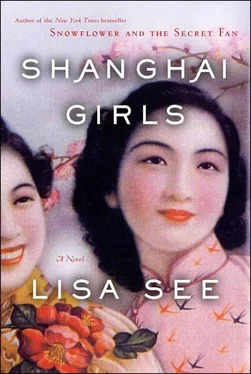At the border between the International Settlement and the French Concession, the rickshaw boy stops. We pay him, cross the street, step around a dead baby left on the sidewalk, find another rickshaw puller who has a license for the French Concession, and tell him Z.G.’s address off the Avenue Lafayette.
This puller is even dirtier and sweatier than the last. His tattered shirt barely hides the skeletal protuberances that have become his body. He hesitates before daring his way onto Avenue Joffre. It’s a French name, but the street is the center of life for White Russians. Signs in Cyrillic hang overhead. We breathe in the smells of fresh bread and cakes from the Russian bakeries. Already the sounds of music and dancing pour from clubs. As we near Z.G.’s apartment, the neighborhood changes yet again. We pass Seeking Happiness Lane, home to more than 150 brothels. From this street many of Shanghai ’s Famous Flowers-the city’s most talented prostitutes-are elected and featured on the covers of magazines each year.
Our puller lets us out, and we pay him. As we walk up the rickety stairs to the third floor of Z.G.’s apartment building, I pouf the curls around my ears with my fingertips, run my lips together to smooth my lipstick, and adjust my cheongsam so that the bias-cut silk falls perfectly over my hips. When he opens the door, I’m struck again by how handsome Z.G. is: a thick mop of unruly black hair, a slight frame, big, round wire-rimmed glasses, and an intensity to his gaze and demeanor that speaks of late nights, artistic temperament, and political fervor. I may be tall, but he’s taller still. It’s one of the many things I love about him.
“What you’re wearing is perfect,” he enthuses. “Come! Come!”
We never know exactly what he has planned for our sitting. Young women getting ready to dive into a pool, play mini golf, or pull back a bow to send an arrow across the sky have been extremely popular lately. Being fit and healthy is an ideal. Who best to raise China ’s sons? The answer: a woman who can play tennis, drive a car, smoke a cigarette, and still look as approachable, sophisticated, and beddable as possible. Will Z.G. ask us to pretend we’re about to go out for an afternoon of tea dancing? Or will he compose something entirely fictional, requiring us to change into rented costumes? Will May be Mulan, the great woman warrior, brought back to life to promote Parrot wine? Will I be painted as the fictional maiden Du Liniang from The Peony Pavilion to extol the merits of Lux toilet soap?
He leads us to a scene he’s set up: a cozy corner with an overstuffed chair, an intricately carved Chinese screen, and a ceramic pot decorated in a never-ending knot pattern from which some sprigs of blooming plum give the illusion of outdoor freshness.
“Today we’re selling My Dear cigarettes,” Z.G. announces. “May, I’d like you in the chair.” Once she sits down, he stands back and stares at her intently. I love Z.G. for the gentleness and sensitivity he shows my sister. She’s young after all, and what we’re doing isn’t exactly something most well-bred girls do. “More relaxed,” he directs, “like you’ve been out all night and want to share a secret with your friend.”
After positioning May, he calls me over. He puts his hands on my hips and twists my body until I perch on the backrest of May’s chair.
“I love your long lines and the length of your limbs,” he says, as he brings my arm forward so that my weight rests on my hand while I balance over May. His fingers spread mine, separating the pinkie from the rest. His hand lingers for a moment, and then he edges back to look at his composition. Satisfied, he gives us cigarettes. “Now, Pearl, lean toward May as though you just lit your cigarette from the tip of hers.”
I do as I’m told. He steps forward one last time to move a tendril of hair from May’s cheek and tilt her chin so that the light will dance on her cheekbones. I may be the one Z.G. likes to paint and touch-and how forbidden that feels-but May’s face sells everything from matches to carburetors.
Z.G. moves behind his easel. He doesn’t like us to speak or move when he paints, but he keeps us entertained by playing music on the phonograph and talking to us about this and that.
“Pearl, are we here to make money or have fun?” He doesn’t wait for my answer. He doesn’t want one. “Is it to tarnish or burnish our reputations? I say neither. We’re doing something else. Shanghai is the center of beauty and modernity. A wealthy Chinese can buy whatever he or she sees on one of our calendars. Those who have less money can aspire to have these things. The poor? They can only dream.”
“Lu Hsün thinks differently,” May says.
I sigh impatiently. Everyone admires Lu Hsün, the great writer who died last year, but that doesn’t mean May should be talking about him during our sitting. I keep quiet and hold my pose.
“He wanted China to be modern,” May continues. “He wanted us to get rid of the lo fan and their influence. He was critical of beautiful girls.”
“I know, I know,” Z.G. responds evenly, but I’m surprised by my sister’s knowledge. She’s not a reader; she never has been. She must be trying to impress Z.G., and it’s working. “I was there the night he gave that speech. You would have laughed, May. You too, Pearl. He held up a calendar that just happened to be of the two of you.”
“Which one?” I ask, breaking my silence.
“I didn’t paint it, but it showed the two of you dancing the tango together. Pearl, you were dipping May back. It was very-”
“I remember that one! Mama was so upset when she saw it. Remember, Pearl?”
I remember all right. Mama was given the poster from the store on Nanking Road where she buys napkins for the monthly visit from the little red sister. She cried and railed and yelled that we were embarrassing the Chin family by looking and acting like White Russian taxi dancers. We tried to explain that beautiful-girl calendars actually express filial piety and traditional values. They are given away at Chinese and Western New Years as incentives, special promotions, or gifts to favored clients. From those good homes, they trickle down to street vendors, who sell them for a few coppers to the poor. We told Mama that a calendar is the most important thing in life for every Chinese, even though we didn’t believe it ourselves. Whether rich or poor, people regulate their lives by the sun, the moon, the stars, and, in Shanghai, by the tide of the Whangpoo. They refuse to enter into a business deal, set a wedding date, or plant a crop without considering the auspiciousness of feng shui . All this can be found in the borders of most beautiful-girl calendars, which is why they serve as almanacs for everything good or potentially dangerous in the year to come. At the same time, they are cheap decorations for even the lowest home.
“We’re making people’s lives more beautiful,” May explained to Mama. “That’s why we’re called beautiful girls.” But Mama only calmed down after May pointed out that the advertisement was for cod-liver oil. “We’re keeping children healthy,” May said. “You should be proud of us!”
In the end, Mama hung the calendar in the kitchen next to the phone so she could write important numbers-for the soy-milk vendor, the electrician, Madame Garnet, and the birth dates for all our servants-on our exposed, pale legs and arms. Still, after that incident, we were careful about which posters we brought home and worried about which ones might be given to her by one of the neighborhood tradesmen.
“Lu Hsün said that calendar posters are depraved and disgusting,” May picks up, barely moving her lips so she can keep her smile in place. “He said that the women who pose for them are sick. He said this kind of sickness doesn’t come from society-”
Читать дальше












